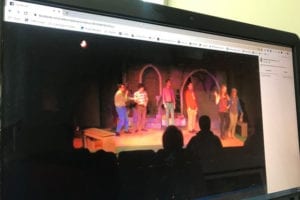Posted March 19, 2020
Art can provide escapism and spiritual sustenance, and other thoughts on what masterpieces say in a time of social distancing.
 Originally published on March 18, 2020 by Terry Teachout in the Wall Street Journal
Originally published on March 18, 2020 by Terry Teachout in the Wall Street Journal

Facebook Live Stream of ‘Love’s Labour’s Lost’ by Rubber City Theatre
How does a New York drama critic spend his Friday nights when Broadway’s theaters are closed up tight? I don’t know about my colleagues, but I curled up on the couch with my laptop last week and watched a live performance in Akron, Ohio, of Shakespeare’s “Love’s Labour’s Lost.”
Like most of America’s theater companies, Rubber City Theatre has since been shut down in the hope of containing the spread of the coronavirus, so it decided to live-stream via Facebook the final performance of its current production as a gesture of solidarity with everyone who knows how vital great art is in times of trial. I heard of the webcast by chance, and a quick search established that it was, so far as I know, the first theater company anywhere in the world to live-stream a show in response to the coronavirus crisis. I tuned in, and was delighted by what I saw.
To be sure, the technical quality of the one-camera webcast was primitive—the picture was fuzzy and there was no “camerawork” whatsoever. But that didn’t matter in the least: The play came through clearly, and that was all that mattered. Kelly Elliott’s modern-dress staging was satisfyingly simple and lively, and the handful of loyal audience members sprinkled throughout the company’s small auditorium were audibly pleased by the results. So was I, and I found myself asking as I watched: What am I getting out of this experience? Why am I so moved? Exactly what do masterpieces have to say to us at moments like these?
In Shakespeare’s case, the answer is easy enough. Even in a self-consciously artificial comedy like “Love’s Labour’s Lost,” there are moments of immediacy that reach across the centuries
(and through the screen of your viewing device, whatever it may be) and make you sit bolt upright, stunned by their prescience. In my case, it was these lines spoken by Lord Berowne, one of King Ferdinand’s noble companions, that rang the bell of recognition: “To move wild laughter in the throat of death? / It cannot be; it is impossible: / Mirth cannot move a soul in agony.” For of course it is possible, which explains why we most need the balm of comedy when the roof of the world seems to be crumbling over our heads: Laughter takes us out of ourselves.
But while the escapism of comedy is essential to a healthy life, we need more than mere laughter to thrive, as W.H. Auden reminded us when he penned these wise words: “There must always be two kinds of art, escape-art, for man needs escape as he needs food and deep sleep, and parable-art, that art which shall teach man to unlearn hatred and learn love.” Auden wrote that sentence in 1935, the year in which Hitler put the swastika on the German flag and began rearming in preparation for what he hoped would be his conquest of Europe and the West. It is at such moments that we most need art—both kinds of it.
As I reflect on the three-dozen Broadway productions that no one will see until further notice, I can’t help but wonder: Which ones would have passed muster with Auden? What spiritual sustenance would they have afforded their now-homebound audiences?
I have a feeling that the scheduled Broadway revivals of Edward Albee’s “Who’s Afraid of Virginia Woolf?” and David Mamet’s “American Buffalo,” two of the greatest American dramas of the postwar era, might have proved particularly nourishing. To be sure, we’ve seen a lot of both plays in recent seasons, and I can’t honestly say that I was all that eager for either one to return to Broadway. Nevertheless, they are, to use Auden’s word, parables of human existence in which that most crucial of questions is asked with galvanizing directness: How best can we love one another? Could it be that humankind is locked into a terrible zero-sum game in which, as one of Mr. Mamet’s characters claims, “The world is lies. There is no friendship….We all live like the cavemen”? It is fitting to grapple with such hard questions in hard times.
We also need a generous helping of Auden’s “escape-art” in our cultural diets, and I don’t doubt that Neil Simon’s “Plaza Suite” and the new musical version of “Mrs. Doubtfire,” both of which were set to open next month, would have given their audiences much relief. Still, I confess that the Broadway show to which I was and am looking forward most eagerly is the 50th-anniversary revival of Stephen Sondheim’s “Company,” a deeply serious musical which, like “American Buffalo” and “Virginia Woolf,” asks whether love is possible in a world that seems at times to have been designed to widen the fearful gap that separates soul from soul. In “Being Alive,” the show’s most beautiful and profound song, Mr. Sondheim assures us that we can’t live without it: “Somebody let me come through, / I’ll always be there / As frightened as you, / To help us survive / Being alive.” I don’t know about you, but that’s what I’m going to want and need to hear most when, sooner or later, the lights of Broadway come on again.
— Mr. Teachout, the Journal’s drama critic, is the author of “Satchmo at the Waldorf.” Write to him at tteachout[at]wsj.com.

